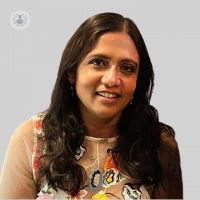Diet management in diabetes
Written in association with:Managing type 1 diabetes should not just focus on using your insulin, but it should also focus on what you are eating. Diet plays a major role in your blood glucose levels, so understanding the role of diet is essential for healthy diabetes management. In this article below, leading endocrinologist, Dr Shanthi Chandran, explains why diet management must accompany diabetic management.

Why is diet management important?
Type 1 diabetes is a condition where the body can no longer produce insulin. Insulin is a hormone that controls the level of glucose within the blood. It is really important that glucose levels stay within a normal range as much of the time as possible. If this is not the case, then over time, that can lead to some of the complications associated with having diabetes.
In type 1 diabetes, the body cannot produce insulin, so it has to be given by injection. However, the amount of insulin you give will depend on the food that you eat. Therefore, it really is not the case that you can just eat whatever you like if you have type I diabetes, regardless of knowing what it is. This is because, while in theory, you can eat all sorts of different things, what is really important is that you need to know how much carbohydrate is in each meal that you are eating.
Why do you need to know how much carbohydrate is in each meal?
Knowing this will determine how much insulin you need to inject, which is really important because if you inject too much insulin, there is a risk that your blood glucose level will go too low. Anyone with type I diabetes will know that low blood glucose levels or a ‘hypo’ is really quite unpleasant. On the other hand, if you don't inject enough insulin, then your blood glucose level will go too high. As a result, what you have eaten won’t be covered by the insulin injected.
So, first and foremost, it is really important that you know how many carbohydrates are in what you're eating. That means that each person with type I diabetes needs to understand and needs to learn how to assess the carbohydrates in each and every meal. This is because every single meal will have an effect.
Some people will choose to have some meals without any carbohydrates, which is fine. However, in order to do that, you need to know the foods that don't have carbohydrates, and that is encompassed in what we call the dietary management of type 1 diabetes.
Should I stick to a restricted carbohydrate diet?
If you have type I diabetes, I really do think that restricting your carbohydrate intake is a very good idea. The reason for saying that is that it is the carbohydrates in the food that make the blood glucose level go up, which ultimately is what we want to avoid.
Interestingly, there was a vogue some years ago which said that if you have type 1 diabetes, using modern insulin can allow you to eat what you like, providing you inject the correct amount of insulin. However, now, I have come to believe that this train of thought does not make sense. And why is that?
- Firstly, if you are having a meal with a large amount of carbohydrates, you have to inject a large amount of insulin, which isn't necessarily such a good idea. If you have too much insulin in your system then there is a greater risk of having a hypo.
- Secondly, a meal which has a large amount of carbohydrates can raise the blood glucose level for sometimes many hours. This may not correlate with the length of time that the insulin is acting for, particularly the shorter acting insulins that we tend to use nowadays.
Therefore, the bottom line is that if you have type 1 diabetes, you should really understand how carbohydrates work and how much of them different foods have. Knowing this can help you to better manage your condition, avoiding the dangers and experience of having too high or too low blood glucose levels.
To book an appointment with Dr Shanthi Chandran today, simply visit her Top Doctors profile.


